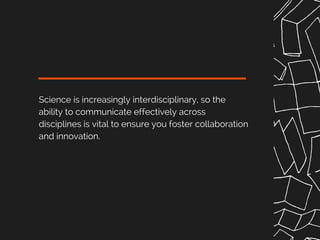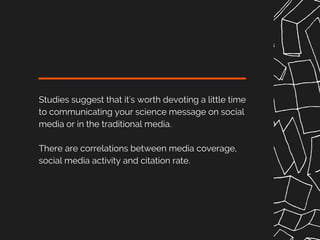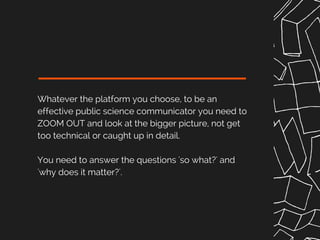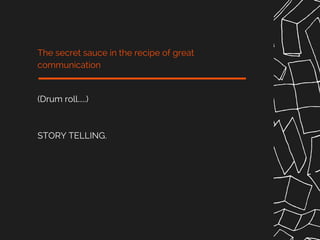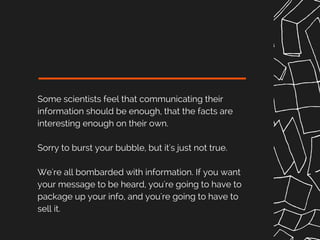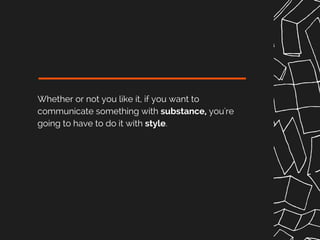Science Communication Module 1
- 1. N A T F O X O N A R C C E N T R E O F E X C E L L E N C E F O R E L E C T R O M A T E R I A L S S C I E N C E S C I E N C E C O M M U N I C A T I O N
- 2. Module 1 How communication is a core professional skill Why you should care about being a more effective communicator How storytelling is the secret sauce in the recipe of great communication
- 3. When scientists communicate more effectively, science thrives - S C I E N T I F I C A M E R I C A N
- 4. To be a good scientist, you need to be a good communicator Communication is inherent in some of the key parts of your job. You work includes giving talks, writing papers and proposals, pitching to various audiences and educating people.
- 5. Communication is increasingly becoming a core professional skill Being able to communicate to lay audiences builds support for science and promotes understanding, plus encourages more informed decision-making.
- 6. Science is increasingly interdisciplinary, so the ability to communicate effectively across disciplines is vital to ensure you foster collaboration and innovation.
- 7. Great communication skills can help you secure funding or find a job. These skills will allow you to write better research papers and be a better teacher for younger scientists.
- 8. If you are ever frustrated by misinformation in the media around science topics, you can counter that by being an influential communicator yourself – and setting the record straight.
- 9. Studies suggest that it's worth devoting a little time to communicating your science message on social media or in the traditional media. There are correlations between media coverage, social media activity and citation rate.
- 10. As a scientist, you need to ask yourself: If you're NOT interested in being better understood, why ARE you writing that paper? Why ARE you speaking at that conference? Why ARE you making that poster?
- 11. You are an expert in your scientific field. Now it's time to become an expert in communication, too.
- 12. Know your audience. The first principle of communication is the same whether it's public communication or academic.
- 13. Know at what level you need to pitch your communication (and never assume prior knowledge). After you know your audience, then you can think about the goal of your communication, and your message.
- 14. BUT... a little effort goes a long way. You might not want to be on prime-time TV, but perhaps you'd like to write blog posts, create explainer-videos, tweet, make a podcast, do animations, write songs... there's an opportunity for every personality. Public communication isn't everyone's idea of a fun time
- 15. Whatever the platform you choose, to be an effective public science communicator you need to ZOOM OUT and look at the bigger picture, not get too technical or caught up in detail. You need to answer the questions 'so what?' and 'why does it matter?'.
- 16. TIP Most scientists are very worried about being WRONG. That's understandable in a scientific context. HOWEVER. In public communication, you MUST let that go because it doesn't come across well. Think of how boring most politicians are in interviews - SO worried about sticking to the right message. You're dealing with an introductory level of knowledge, so you can relax and trust yourself.
- 17. (Drum roll.....) STORY TELLING. The secret sauce in the recipe of great communication
- 18. Some scientists feel that communicating their information should be enough, that the facts are interesting enough on their own. Sorry to burst your bubble, but it's just not true. We're all bombarded with information. If you want your message to be heard, you're going to have to package up your info, and you're going to have to sell it.
- 19. How do you package up and sell your information? You create a STORY around it. Who's the most fun person in a room at any time? It's the person who tells great stories. ps. there are no boring stories, only boring story tellers.
- 20. Whether or not you like it, if you want to communicate something with substance, you're going to have to do it with style.
- 21. Scientist and pro-communicator Randy Olsen talks at his TEDMED talk about the very basic structure of a good story: Rather then the common 'here's the data and here's a graph and here's another graph and here's another graph', Randy teaches to structure a story with '... AND... BUT...THEREFORE'. It'll make perfect sense when you watch the video. (but first.... one more slide. or two.)
- 22. Your task is to watch Randy's TEDMED video (9min30sec), then structure your own research story by using Randy's 'story mode' of AND, BUT, THEREFORE. Boring is OUT, style is IN. Go for it.
- 23. W W W . E L E C T R O M A T E R I A L S . E D U . A U Nat Foxon





